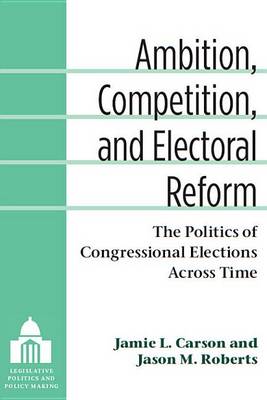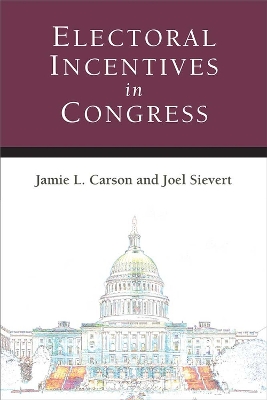Legislative Politics and Policy Making
2 total works
Ambition, Competition, and Electoral Reform
by Jamie L Carson and Prof Jason Matthew Roberts
Published 1 January 2013
In Ambition, Competition and Electoral Reform, Jamie L. Carson and Jason M. Roberts present an original study of U.S. congressional elections and electoral institutions for 1872-1944 from a contemporary political science perspective. Using data on late nineteenth and early twentieth century congressional elections, the authors test the applicability in a historical context of modern political science theories, assess the effects of institutional reforms, and identify the factors that shape the competitiveness of elections. They present several key findings: the strategic politicians theory is applicable in an era without candidate-centred campaigns; there was an incumbency advantage prior to the full development of candidate-centred campaigns; institutional reforms have had a significant effect on elections; and the degree of electoral competition frequently correlates with elected officials' responsiveness to citizens.
David Mayhew’s (1974) thesis regarding the “electoral connection” and its impact on legislative behavior has become the theoretical foundation for much of the existing research on the modern U.S. Congress. In its most basic form, Mayhew’s theory contends that once in office, legislators pursue whatever actions put them in the best position to achieve reelection. The electoral connection has traditionally been considered a phenomenon of the post-World War II environment, but legislative scholars have begun to suggest that Mayhew’s argument applies to politics in earlier congressional eras as well. To assess these disparate claims more systematically, Carson and Sievert investigate whether legislators in earlier historical eras were motivated by many of the same factors that influence their behavior today, especially with regard to the pursuit of reelection. In this respect, they examine the role of electoral incentives in shaping legislative behavior across a wide swath of the nineteenth century. This entails looking at patterns of turnover in Congress across this period, the politics underlying renomination of candidates, the changing role of parties in recruiting candidates to run and its broader effect on candidate competition, as well as electoral accountability across a variety of dimensions. The results have wide-ranging implications for the evolution of Congress and the development of various legislative institutions over time.

